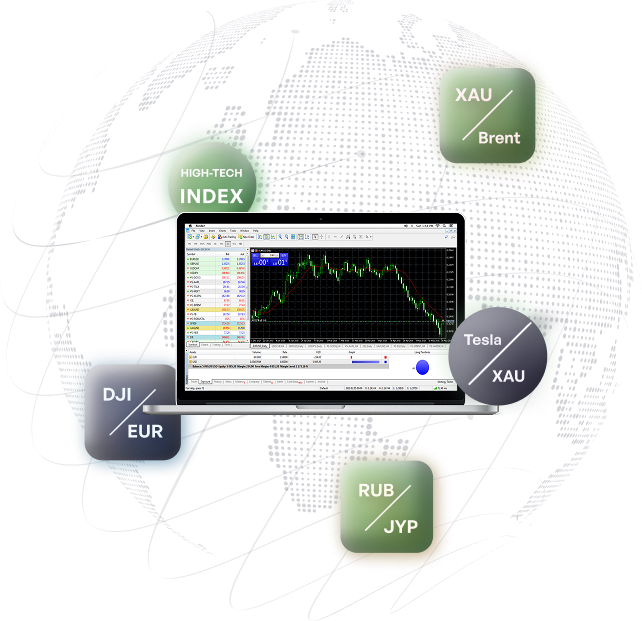- Education
- Learn to Trade Crypto
- How to trade Ethereum
How to trade Ethereum
Ethereum Trading
While Bitcoin is the leading cryptocurrency in terms of the value of its coins in circulation, Ethereum is not so far behind, with a market capitalization of over £240 billion, it is the second leading form of cryptocurrency. Ethereum was a success as well - Ethereum was valued under $1, later its price has gone as high as $4,812.

Ethereum drew lot's of attention since its creation, because this cryptocurrency actually showed how Bitcoin's blockchain could be enhanced to new functions.
With all this attention and major volatility Ethereum trading has become quite lucrative.
So, if you are interested in how to trade Ethereum, go through the article, where we will show you all the steps.
KEY TAKEAWAYS
- Ethereum actually showed how Bitcoin's blockchain could be enhanced to new functions.
- Ethereum market capitalization is over £240 billion, it is the second leading form of cryptocurrency.
- If you enter the position with a buy order, you must exit with a sell order - and vice versa.
ETHUSD Trading
Proper money management during Ethereum trading is the most important part in trading, and if applied correctly in a strong trending environment, it should deliver a huge return on investment, yet due to the huge volatility, losses can also occur, so it is extremely important to use proper money management.
Market stability can be achieved when power shifts from investors looking to profit from price fluctuations to consumers actually using cryptocurrencies.
No matter what asset you choose to trade - be it stocks, forex, or Ethereum - the goal is to correctly predict whether the price of Ethereum will rise above or fall below its current value.
If you manage to speculate correctly, you will obviously make a profit. And, of course, the amount you earn will depend on how much you bet per position.
Ethereum trading works in much the same way as buying and selling any other financial instrument. Cryptocurrencies have only been on the scene for about a decade, so the best way to start trading Ethereum online is to first understand how this digital coin works.
Ethereum is also traded as part of a pair and there are two alternative ways to do so with cryptocoins.
Trading Crypto Pairs with Ethereum's ETH
Ethereum exchange for the main "fiat" currency. A perfect example of this is Ethereum against the US dollar, shown as ETHUSD. The US dollar is one of the most traded currencies in the world, which is why it is often traded alongside cryptocurrencies. Some trading platforms offer Ethereum for the British Pound, Euro, and even the Japanese Yen.
Note: pegging Ethereum to currencies other than the US dollar will reduce liquidity and reduce trading volumes.
Trading Currency Pairs with Ethereum's ETH
In terms of Ethereum trading pairs, this is basically an exchange of Ethereum for another digital currency (not fiat currency). For example, ETHBTC, ETHLTC, ETHXRP, etc. All of these pairs are popular among people who prefer to trade cryptocurrencies, but there are plenty to choose from.
Ether CFDs
When you are trading Ethereum there are two possible ways you can choose to go to:
- Just buying the digital asset, with high hopes that the value of the coin will rise over time.
- Trading Ether CFDs.
When trading CFDs on Ethereum, you do not own the underlying asset. Instead, CFDs are tasked with tracking the real price changes of Ethereum.
All you have to do is try to speculate on its future value in the short term. One of the biggest advantages of Ethereum CFD trading is that you can choose between short or long positions.
This means that if you think that Ethereum will fall in price, you can still make a profit. Of course, first you need to reason correctly.
In addition to this, you will be able to trade on margin through your CFD broker. The ratio we offer for cryptocurrency CFDs is limited to 1:10. This ratio means that you can enter the Ethereum market at $1,000 and only need to deposit $100. So the broker is essentially lending you the rest.
Note. CFDs are complex instruments and carry a high level of risk.
How to Trade Ethereum
There are a few different options when it comes to placing an order, which is: buy and sell.
You always need to place a buy or sell order when trading Ethereum online.
Buy and sell orders let your broker know whether you think the price will rise or fall. So it’s simple but imperative.
For example, using Ethereum against the US dollar:
Let’s say that ETH/USD has been quoted at $1901.00
- If you think the value is going to go above $1901.00 - place a buy order
- And if you think the price will fall below $1901.00 - place a sell order
If you enter the position with a buy order, you must exit with a sell order - and vice versa.
Entering
When it comes to placing an order on the Ethereum trading platform of your choice, you can choose either a limit order or a market order.
So, if you want your Ethereum position to be triggered immediately, place a market order with your online broker.
Due to the volatile nature of the Ethereum trading arena, the price will be slightly different from what you see on the order form. This happens within the few seconds it takes to complete an order, and it's unavoidable.
If you want to specify the price at which you would like to enter the market, create a limit order on the Ethereum trading platform of your choice.
For example, if the price of ETHUSD is $1901.0, you may not want to enter until it reaches $1925.0. If or when this happens, the broker will execute your Ethereum trade for you.
Which order is most appropriate will depend on various aspects.
For example, if Ethereum is skyrocketing, you may want to get a share of the stock without delay. This can be achieved by creating a market order. Your broker will then immediately execute your trade, providing you with the current or next best available Ethereum price.
As we have already said, limit orders are different here you can specify the exact price. This is a great way to lock in potential profits as you can maintain some level of price control.
When you have used your buy or sell order, as well as your market or limit order, you can close the trade when you feel the time is right.
Exiting
So if you enter a position in one way, you need to exit using the opposite order. Hence, if you enter a trade with a sell order, you must place a buy order to close it.
In terms of an exit strategy, it is also recommended to make full use of stop loss and take profit orders. Both stop loss and take profit will be automatically executed at the price you specify.
So let's say you don't want to lose more than 3% on your trade. Thus, you should create a stop loss order at a price 3% above or below your entry price - depending on whether you are long or short Ethereum.
When it comes to taking profit orders, it's almost the same process.
In this example, you will create a take profit order 5% above/below the current price. If Ethereum reaches this price, your order is automatically filled, securing your profit and closing the position.
Let's look at an example of how this might look in real life:
Imagine that ETH/USD is valued at $1901.0. You decide to go long, so place a buy order with your broker.
You decide you want to lose at least 3%.
With that in mind, you place a stop loss at $1,895.297.
Now let's say you want to make a profit of 5% on your position.
With this in mind, you place an order for a profit of $1,910.505.
Once the pair drops to $1,895.297 your stop loss will be triggered. And vice versa, if the pair rises to $1,910.505, your take profit will work.
In this case you don’t have to manually monitor Ethereum price action in real time. Instead, your position will be closed automatically - regardless of whether you make a profit or a loss.
Bottom Line on How to Trade Ethereum
There are two ways to interact with the crypto market - on a crypto exchange or trading crypto contracts on an online CFD platform.
Remember, when trading CFDs on Ethereum, you do not own the underlying asset. All you have to do is to speculate on its future value in the short term. Biggest advantage of Ethereum CFD trading is that you can choose between short or long positions. This means that if Ethereum falls in price, you can still make a profit. Of course, first you need to reason correctly.
Crypto FAQs
What is Cryptocurrency Trading?
Cryptocurrency trading is the exchange of digital currency between traders. The fluctuations caused by supply and demand allow traders to profit from it. Cryptocurrency trading is both risky and rewarding due to its volatility.
How to Trade Cryptocurrencies?
You’ll need to open an account with a crypto brokerage company. The next step is to choose a trading platform. After that choose crypto to invest in and strategy to trade with. Final step is to store your cryptocurrency.
Can you Trade Crypto 24/7?
Yes. Cryptocurrency markets are open 24 hours a day, 7 days a week all year round. Traders have the opportunity to buy and sell without restrictions as the cryptocurrency markets do not close.
What are Most Traded Cryptos?
These are the 5 most traded cryptos all over the world
- Bitcoin - Market cap over $846 billion
- Ethereum - Market cap over $361 billion
- Tether - Market cap - over $79 billion
- Binance Coin - Market cap - over $68 billion
- XRP - Market cap - over $37 billion
What is Cryptocurrency Market?
Cryptocurrency is a form of decentralized currency and It's a completely digital asset. At its core, cryptocurrency uses blockchain technology to generate code segments that are unique for each transaction, just like serial numbers. Every time cryptocurrencies exchange hands, code segments are written to a decentralized ledger.
0+ New
Instruments and Indices

